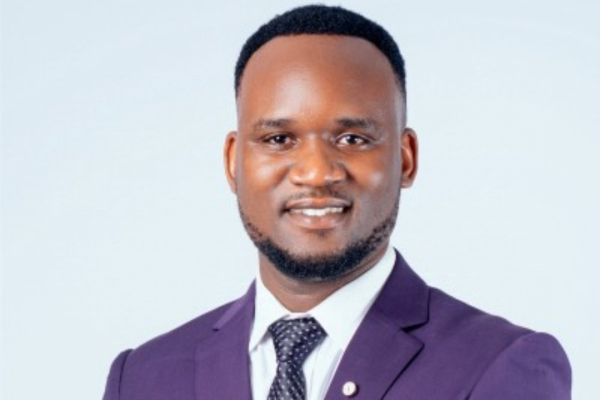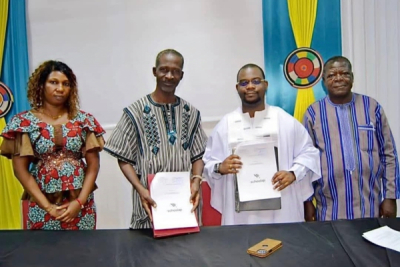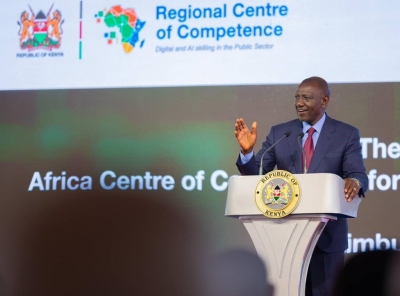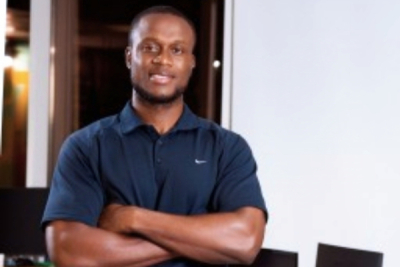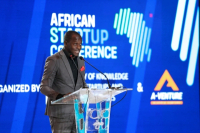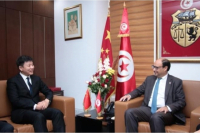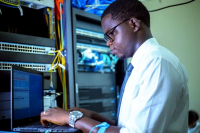He is an entrepreneur specializing in the healthcare sector, leveraging technology to revolutionize the delivery of healthcare services in Tanzania.
Henry Mathayo (photo) is a Tanzanian entrepreneur and digital innovator who is redefining access to healthcare through technology. He is the founder and CEO of MedPack Tanzania, a company leveraging mobile solutions to revolutionize healthcare delivery.
Founded in 2020, MedPack Tanzania aims to streamline access to essential medicines and healthcare products through advanced digital tools and fast service delivery. The company offers a mobile application designed to optimize inventory management, procurement, and sales for healthcare facilities.
The app also enables patients to order medications from pharmacies and have them delivered to their homes. Additionally, it provides a platform for scheduling medical appointments via telemedicine. "We are committed to revolutionizing the accessibility and delivery of healthcare by providing quality medicines and services to all Tanzanians at low cost with fast home delivery," the company's website states.
In addition to his work with MedPack, Mathayo is a co-founder and board member of Health Initiative Afrika, a startup established in 2017 that focuses on improving healthcare by addressing health challenges through education, technology, and innovation.
Trained in pharmacy and international relations, Henry Mathayo began his career in 2018 as a pharmacy technician at the Benjamin Mkapa Hospital. Between 2020 and 2022, he served as a data analyst at dLab Tanzania, a center dedicated to data management and utilization.
By Melchior Koba,
Editing by Sèna D. B. de Sodji
After completing his studies in the United States, he returned to Uganda to apply his knowledge and skills for the benefit of his country. Passionate about technology, he developed innovative solutions that make it easier for people to access financial services and capital.
Abraham Banaddawa (photo) is a Ugandan investment advisor and technology entrepreneur. He is the founder and CEO of Level Africa, a company dedicated to simplifying, accelerating, and securing investments for individuals.
Founded in 2021, Level Africa offers a digital investment platform that provides users access to top-tier investment opportunities while delivering essential insights to grow their wealth. The platform enables investments in Treasury bonds, mutual funds, and fixed-income assets, offering returns of up to 17%.
"After extensive research, I founded Level to provide safe, vetted African investment opportunities. We prioritise user-friendly access, thorough vetting, and affordable entry points, starting at just $26," Banaddawa explains. Currently, Level Africa boasts over 500,000 users and serves around 50 institutional clients.
In addition to his work at Level Africa, Banaddawa is the founder and CEO of Utilis Ventures, a fintech company established in 2018. Utilis Ventures develops scalable and practical solutions to tackle financial challenges across Africa, actively addressing economic inequalities.
Banaddawa holds a bachelor's degree in biology with minors in chemistry and business from Florida Southern College, USA, which he earned in 2014. In 2016, he joined Zzimba Games as a creative designer, contributing to the game publishing industry. By 2019, he had transitioned to project management at CryptoSavannah, a tech company specializing in blockchain-based solutions.
By Melchior Koba,
Editing by Sèna D. B. de Sodji
Information and communication technologies (ICT) hold significant potential to foster creativity and learning from an early age. However, in Africa, their integration into education remains limited, hindered by a lack of preparedness and inadequate infrastructure.
SCHOOLAP, a digital platform dedicated to remote education, announced on Friday, December 6, a strategic partnership with the National Union of Secular Private Educational Institutions (UNEPEL) in Burkina Faso. The project aims to modernize more than 1,400 private secular schools across the country through tailored technological solutions.
“Several pilot schools in Ouagadougou are currently being activated with data collection, training for stakeholders, and the provision of educational tablets. Initial feedback has been very positive, particularly regarding tools designed for school directors,” SCHOOLAP stated in a press release.
This initiative aligns with a broader continental push for educational advancement. The African Union has designated 2024 as the "Year of Education," urging nations to intensify efforts to ensure inclusive, quality education. As part of this momentum, the African Union’s Digital Education Strategy (2023–2028) prioritizes the development of digital infrastructure in schools. Goals include equipping at least 50% of schools with high-speed internet by 2027 and ensuring that one-third of students and all teachers have access to digital devices by 2030.
The partnership between SCHOOLAP and UNEPEL represents a significant step forward for Burkina Faso, where digital educational infrastructure remains underdeveloped. By modernizing school management and providing tailored educational tools, this initiative not only enhances teaching but also positions the country within a continental vision focused on the future of education in Africa.
By Samira Njoya,
Editing by Sèna D. B. de Sodji
Africa has a young, tech-savvy population, but a significant skills gap in digital technologies remains. This gap is a barrier to maximizing the continent’s potential. Creating centers for digital skilling can directly address this challenge by providing targeted training for the youth to help accelerate the continent’s digital transformation.
Kenya has launched the Timbuktoo GreenTech Hub and the Africa Centre of Competence for Digital and AI Skilling to drive Africa's digital and green transformation. Led by the Ministry of Information, Communications, and Digital Economy (MICDE) in partnership with the UNDP, Konza Technopolis, and other stakeholders, the initiatives were inaugurated by President William S. Ruto on December 6.
President Ruto highlighted Africa’s untapped potential, stating, “Through the timbuktoo GreenTech Hub and the Africa Centre of Competence for Digital and AI Skilling, we can harness emerging technological opportunities and invest in ideas that propel Africa as the next frontier of tech-enabled response to the impacts of climate change and enhanced public service delivery.”
Ahunna Eziakonwa, UN Assistant Secretary-General and UNDP Africa Regional Director, noted, “Africa’s green and climate tech sectors hold immense potential. The timbuktoo GreenTech Hub will leverage initiatives like the Africa Green Industrialisation Initiative to unlock Africa’s green energy capacity.”
The timbuktoo GreenTech Hub, hosted at Konza Technopolis, invites African innovators to develop and scale climate solutions, while the Africa Centre of Competence will train 100,000 Kenyan civil servants in its first phase, expanding to include participants from Uganda, Rwanda, Tanzania, and Nigeria. It will equip civil servants with digital competencies to enhance efficiency and policymaking. Partners like Microsoft and Google are supporting the program to modernize public service delivery.
The timbuktoo GreenTech Hub is vital for Africa’s green transformation as it supports the development of climate-resilient solutions across the continent. Africa is particularly vulnerable to the impacts of climate change, including extreme weather events, droughts, and rising temperatures. A report from the Carbon Disclosure Project (CDP) highlights that Africa contributes only 3.8% of global greenhouse gas emissions, yet it bears the brunt of the consequences of climate change. The hub aims to accelerate the development of green technologies by providing startups with the resources needed to scale their solutions.
Kenya is strategically positioned as a regional hub for digital and green innovation. The Konza Technopolis, where the GreenTech Hub is hosted, has been developed as “Africa’s Silicon Savannah,” and is poised to attract tech startups and investors. These initiatives advance the African Union’s vision for a prosperous, tech-driven, and inclusive continent.
Hikmatu Bilali
To help young Moroccans, both graduates and non-graduates, find employment, a tech entrepreneur has developed a tailored solution.
JobUp, a digital solution developed by a Moroccan startup, allows users to easily find service providers for everyday needs across the country.
Founded in 2020 by Mohamed Ennamli, JobUp was born out of the challenges faced by young graduates entering the job market during the COVID-19 pandemic. "JobUp is a career accelerator for young graduates seeking to enter the job market," Ennamli said. "With the lockdown and its impact on the job market, the application became a necessity, as it serves all job seekers and improves their financial situation."
The solution includes a mobile application available on both iOS and Android, which has been downloaded more than 100,000 times, according to Play Store data. Users create an account and set up their profiles within the app. Service seekers post ads with detailed descriptions of their needs, while interested providers apply. Users then select the provider that best suits their needs and budget, scheduling the service at the agreed-upon location, date, and price.
Service providers also create detailed profiles within the app, showcasing their expertise and services offered. The platform connects users with a wide range of professionals, including hairdressers, cooks, plumbers, masons, and housekeepers.
Since its launch, JobUp has attracted more than 10,000 profiles and over 15,000 users across more than 20 cities throughout Morocco.
By Adoni Conrad Quenum,
Editing by Sèna D. B. de Sodji
A civil engineer with over 7 years of experience in the United States, he also stands out as an entrepreneur. He develops financial solutions aimed at improving access to and the quality of healthcare in Africa.
Loubao Kraka is an Ivorian tech entrepreneur and the founder of EnvoyX, a startup providing insurance and payment services for healthcare providers in Africa.
Founded in 2023, EnvoyX specializes in payment processing for the healthcare sector. Leveraging artificial intelligence (AI), the company simplifies and accelerates the settlement of medical bills. It also facilitates reimbursement claims to insurers, enabling healthcare providers to receive payments for their services more quickly.
EnvoyX also stands out for its fraud detection capabilities. By identifying suspicious patterns and anomalies in claims, it helps reduce fraudulent activities, protect revenue streams, and strengthen the financial security of healthcare stakeholders.
Before founding EnvoyX, Loubao Kraka had already built a notable entrepreneurial career. In 2019, he co-founded Innovative Apollo Media, a U.S.-based company dedicated to supporting Black-owned businesses and young entrepreneurs in achieving their goals.
In 2020, he launched RaiseMeFunds, a crowdfunding platform for Africans. This initiative allows users to raise funds for significant events such as celebrations or graduations, as well as to cope with challenging situations like natural disasters or illnesses.
The Ivorian entrepreneur graduated from Harris-Stowe State University in the United States, where he earned a bachelor’s degree in mathematics in 2017. He also holds a bachelor’s degree in civil engineering, obtained in 2021 from Washington University in St. Louis.
His professional career began in 2017 at ABNA Corporation, a U.S.-based civil engineering firm, where he worked as a civil engineer. In 2018, he joined the Missouri Department of Transportation as a transportation engineering intern, serving as an ambassador for MassChallenge, an organization supporting start-ups and entrepreneurs. Between 2021 and 2023, he worked as a product manager at VISA, the multinational specializing in digital payments.
Melchior Koba
After earning his first university degree in Senegal, he pursued further studies in the Czech Republic, where he obtained a doctorate. He brings over seven years of experience to the table in the fields of data science, artificial intelligence, cloud computing, and automation.
Doudou Ba (photo) is a Senegalese data scientist, automation specialist, and tech entrepreneur. He is the founder and CEO of OneNine, a company established in 2023 that specializes in developing artificial intelligence (AI) solutions.
OneNine’s mission is to provide scalable AI and cloud technologies tailored to the commercial needs of its clients. Through its solutions, businesses can leverage smart automation and the opportunities offered by data analytics. OneNine also offers Microsoft-certified training and personalized AI support to prepare teams for the challenges of digital transformation. Its expertise spans the entire Microsoft Cloud Stack and comprehensive cloud architecture. To date, the company has successfully completed seven projects.
Doudou Ba also serves as a data scientist at A.P. Moller - Maersk in Sweden, a transport and logistics company with approximately 110,000 employees across 130 countries. His academic journey began at the University of Thiès in Senegal, where he earned a bachelor’s degree in hydraulic engineering in 2015. He continued his studies at the Czech University of Life Sciences in Prague, earning a master’s degree in environmental modeling in 2021. He then obtained a doctorate in machine learning and neurohydrology this year at Charles University in the Czech Republic. Currently, he is pursuing a master’s degree in software engineering at the Blekinge Institute of Technology in Sweden.
Before moving to the Czech Republic, Doudou Ba worked from 2016 to 2017 at Senegal’s Office des Forages Ruraux as an operations control officer. In Prague, he joined YUNGO, a telecom engineering company, in 2019 as a telecom engineer. In 2020, he joined Infosys, a consulting and digital services firm, where he held the position of process manager.
By Melchior Koba,
Editing by Sèna D. B. de Sodji
Artificial intelligence (AI) presents a significant opportunity to accelerate technological and economic development in Africa. Recognizing its immense potential, countries across the continent are actively striving to coordinate their efforts, define common strategies, and maximize its impact.
African digital ministers are advocating for the implementation of unified policies on artificial intelligence (AI) across the continent, according to the "Algiers Ministerial Declaration on StartUp and AI Development" adopted at the third African StartUp Conference.
The declaration, issued after the three-day conference held in Algiers from December 5-7, emphasized the need for strengthened cooperation among African nations. Ministers from 45 countries stressed the importance of defining a common regulatory framework tailored to the unique challenges of digital development in Africa.
A unified framework would harmonize regulations, promote knowledge-sharing, and mobilize resources for large-scale AI projects, creating an ecosystem conducive to innovation and technological development across the continent. It would also facilitate strategic investments in digital infrastructure while opening new markets for African start-ups on a regional and global scale.
However, significant challenges remain, including a lack of specialized AI skills, inequalities in access to technology between urban and rural areas, and insufficient infrastructure such as data centers and high-speed networks. To address these challenges, ministers called for increased training, expanded public-private partnerships, and efforts to ensure equitable access to technology across the continent.
This initiative aligns with the African Union's Agenda 2063, which prioritizes innovation and digital transformation as drivers of socio-economic development. The United Nations Development Programme (UNDP), in its "Africa Development Insights" report, estimates that AI could contribute up to $1.2 trillion to Africa's GDP by 2030.
A unified AI policy has the potential to transform Africa's digital landscape. It could create an integrated digital ecosystem, foster inter-African cooperation, establish strategic partnerships between universities, research centers, and businesses, and position Africa as a key global player in the field of artificial intelligence.
By Samira Njoya,
Editing by Sèna D. B. de Sodji
The North African country aims to accelerate its digital transformation, a cornerstone of its socioeconomic development strategy. The government plans to invest approximately $25.8 million in digital projects during the 2025 fiscal year.
Tunisia plans to deepen its cooperation with China as part of its digital transformation strategy.
Sofiene Hemissi (photo, right), Tunisia's Minister of Communication Technologies, met with Wang Song (photo, left), China's Vice Minister of Cyberspace Administration, on Thursday during a two-day visit to Tunisia.
Discussions focused on the development of telecommunications infrastructure and artificial intelligence. Both sides reviewed the progress of bilateral cooperation programs in information and communication technologies (ICT) while exploring new avenues for collaboration across various digital sectors.
Tunisia currently ranks first in North Africa and third in Africa in e-governance, according to the United Nations Department of Economic and Social Affairs (UNDESA) report, "E-Government Survey 2024: Accelerating Digital Transformation for Sustainable Development." The country has an e-government development index (EGDI) score of 0.6935 out of 1, exceeding the African average of 0.4247 and surpassing the global average of 0.6382. In ICT development, the International Telecommunication Union (ITU) ranks Tunisia 8th in Africa out of 47 countries, with a score of 77.2 out of 100.
However, it faces challenges in cybersecurity. It is classified as Tier 3, comprising countries with a global score of at least 55/100, demonstrating basic cybersecurity engagement through government-led initiatives. The country needs to strengthen its organizational measures, capacity building, and cooperation to improve its standing.
China, by contrast, ranks 35th globally in e-government development with an EGDI score of 0.8718. The ITU gives China a score of 85.8 out of 100 for ICT development. In cybersecurity, China is categorized as Tier 2, representing countries with a global score of at least 85/100, indicating a strong commitment to cybersecurity through coordinated government actions.
Enhanced collaboration with China in the digital sector could help accelerate Tunisia's digital transformation, a key pillar of its socioeconomic development strategy. However, it should be noted that no new agreements or partnerships were announced or signed during this meeting.
By Isaac K. Kassouwi,
Editing by Sèna D. B. de Sodji
TelCables Nigeria, a subsidiary of Angola Cables, has launched a new Point of Presence (PoP) at the Lagos Rack Centre to improve low-latency interconnectivity and Cloud access across West Africa.
The PoP provides direct access to the South Atlantic Cable System (SACS) and West Africa Cable System (WACS) subsea cables, streamlining data traffic to South America, the U.S., and Europe, with added redundancy for better reliability.
This will strengthen the digital infrastructure of West Africa, providing faster, more reliable internet access.
More...
He is an expert in digital marketing and UI/UX design, as well as a graphic designer and entrepreneur. He leads two companies and provides tailored digital services for both professionals and individuals.
Jihed Rahmouni (photo) is a Tunisian computer scientist and tech entrepreneur. He is the co-founder and CEO of Pepolls, a social media platform empowering users to share their opinions and actively participate in discussions.
Launched in 2020, Pepolls is an innovative poll-based platform allowing users to ask questions, share ideas, and express themselves freely. It features a unique rewards system where users earn "Pecoins" by engaging on the platform. These Pecoins can be used to monetize polls or purchase branded offers and coupons. Additionally, Pepolls leverages blockchain technology to enhance user data security.
Rahmouni is also the founder and CEO of District Agency, a digital agency he established in 2017. The agency provides a comprehensive range of services, including digital marketing, UI/UX design, graphic design, web and mobile app development, community management, and blockchain solutions.
A graduate of the Higher School of Commerce of Tunis, Rahmouni earned a bachelor’s degree in management information systems in 2013. He began his professional career in 2014 as a communications manager at the Robert de Sorbon Institute in Tunis. At the same time, he served as the national client relations manager for AIESEC in Spain, a global network of young students and graduates. Between 2015 and 2017, he also worked as a web developer within the same network.
By Melchior Koba,
Editing by Sèna D. B. de Sodji
He is a digital enthusiast driven by a desire to simplify people's lives. In Algeria, he has already co-founded two startups that continue to thrive.
Abdelhak Bendjebara (photo) is an Algerian tech entrepreneur with a degree in linguistics earned in 2010. He is the founder and CEO of Fridoc, an innovative startup simplifying administrative, technical, and legal procedures in Algeria.
Founded in 2021, Fridoc offers a platform accessible via a mobile app that centralizes administrative, technical, and legal documents available in the country. Its goal is to provide users with quick and convenient access to essential information and guidance on preparing required documents anytime, anywhere.
The Fridoc platform allows users to search for administrative information, easily download forms, and receive notifications to stay updated on the status of their files. Additionally, users can save important documents for simplified future access.
In addition to Fridoc, Bendjebara co-founded La Testeuse Dz in 2024, a digital creation and marketing agency. The agency specializes in producing product review videos for detergents and food products, shared on its Facebook, Instagram, and TikTok pages. It aims to provide authentic, informative evaluations while helping brands better understand consumer expectations.
Before venturing into entrepreneurship, Abdelhak Bendjebara began his career in 2006 as a tele-operator at Euran Call Center, a company providing outbound call services for French-speaking clients. In 2022, he joined N’startupiw, a networking platform for young entrepreneurs, where he worked in the public relations department.
By Melchior Koba,
Editing by Sèna D. B. de Sodji
To help Algerian businesses easily apply for tenders within the country, a tech entrepreneur has developed a tailored solution.
Rhinotenders, a digital solution developed by an Algerian startup, helps companies find the best suppliers to respond to their tenders.
Founded in 2016 by Saïd Hamdani, the Algiers-based startup offers a mobile application available exclusively on Android, which has been downloaded more than 5,000 times, according to Play Store data.
Suppliers register on the platform by providing the required information. They can then discover various opportunities that match their profiles and receive notifications (via email and the app) whenever a new opportunity is posted.
Rhinotenders enables users to submit bids and quotes online with supporting documents, track projects and preferred companies, view buyer profiles with their project histories to improve commercial prospecting, and access a complete daily list of tenders in Algeria (without category restrictions) with advanced search features.
For companies, the process involves creating an announcement on the platform with all the required details, allowing Rhinotenders to identify suitable suppliers. Once this step is complete, suppliers submit their bids, and the company, through its dashboard on the app or web platform, selects the one that best meets its requirements.
The startup not only publishes tenders directly on the platform but also shares information about tenders available on the websites of public and private institutions, buyers, national and regional press, specialized publications, and official bulletins.
Since its launch, Rhinotenders claims to have 40,000 users and has published over 350,000 tenders.
Adoni Conrad Quenum
Digital transformation has emerged as a key driver of economic and technological development across African nations. Through strategic partnerships, innovative initiatives are taking shape to enhance local skills and modernize digital infrastructure.
China has pledged to support Guinea in establishing a Digital Cooperation Academy to train local talent and bolster the country's technological ecosystem, the Guinean government said on Wednesday.
The announcement followed a meeting on Tuesday between Rose Pola Pricemou (photo, left), Guinea's Minister of Posts, Telecommunications, and the Digital Economy, and a Chinese delegation led by Mao Shanshui (photo, right), third secretary at the Chinese embassy in Guinea.
The academy will offer training programs in strategic sectors such as artificial intelligence, data analytics, and cybersecurity, aiming to drive Guinea's digital transformation. It will also support local startups to foster innovation and promote digital entrepreneurship.
This project is part of the broader Guinea-China partnership, highlighted by the completion of the tenth phase of their technical assistance program. This collaboration has already modernized telecommunications infrastructure through the deployment of cutting-edge technologies and improved connectivity services.
In addition to the academy, discussions yielded other key projects, including the construction of new data centers to expand Guinea's data storage and processing capacity.
Both parties agreed to deepen collaboration to accelerate knowledge transfer to Guinean professionals and enhance the performance of broadcasting centers, advancing local talent development and the modernization of the country's digital ecosystem.
Furthermore, an agreement was reached for the official handover of four modernized broadcasting centers in Sonfonia, Labé, Kankan, and Nzérékoré. This marks a significant milestone in upgrading Guinea's telecommunications infrastructure.
These initiatives align with Guinea's digital roadmap, which aims to position the country as a leading technological hub in West Africa. Beyond improving connectivity, they are expected to create new economic opportunities, bridge the digital divide, and enhance Guinea's competitiveness on the global stage.
By Samira Njoya,
Editing by Sèna D. B. de Sodji


